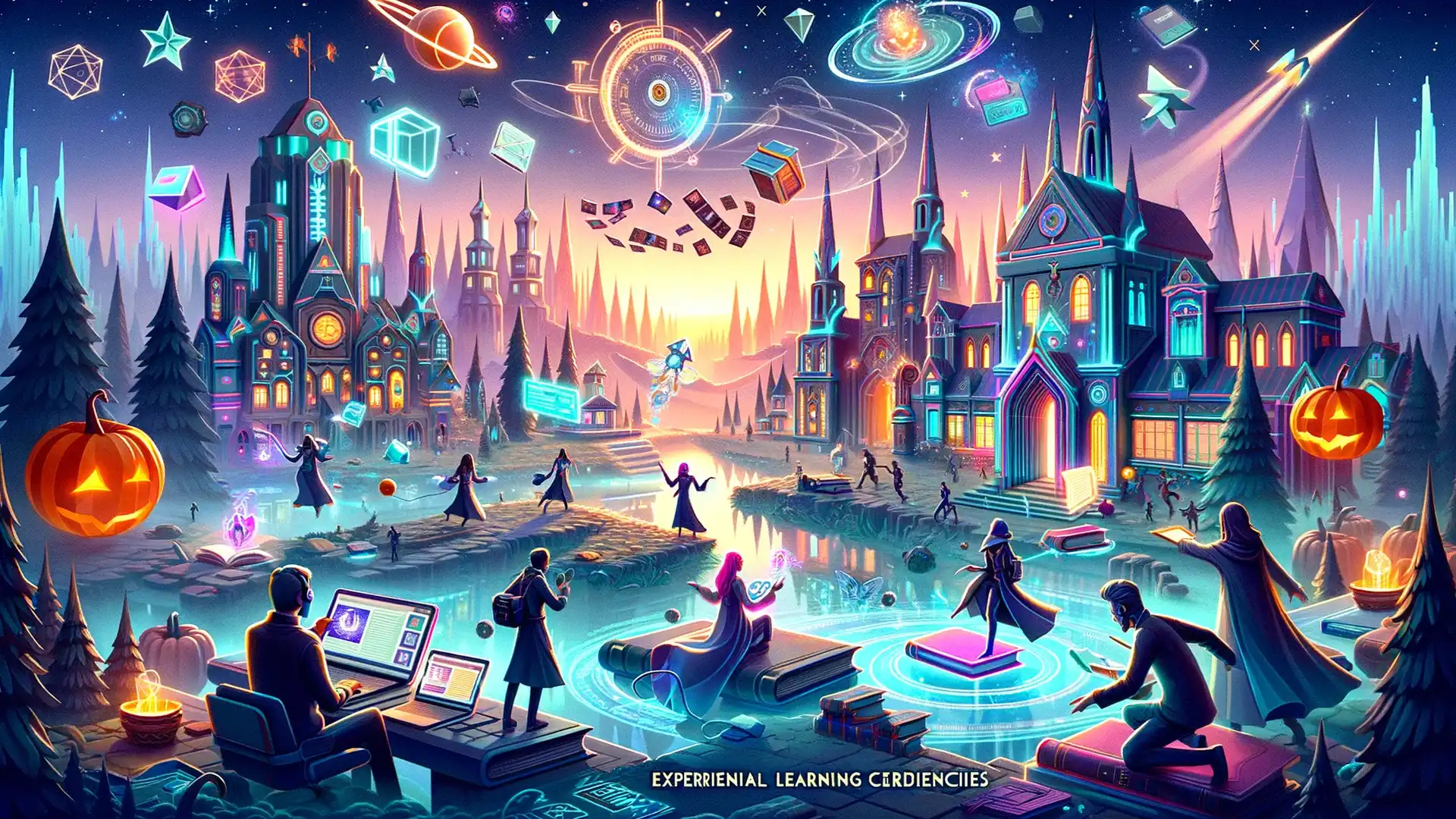NFT Credentials in Experiential Learning and Internships

 Author:
Artem Grigoriev
Author:
Artem Grigoriev
Transforming Education with NFT Credentials: Enhanced Verification and Transparency
Imagine a world where your skills and achievements are permanently documented . They are tamper-proof and easily verifiable from anywhere, anytime. This is the promise of NFT (Non-Fungible Token) credentials in experiential learning and internships.
📘 This article complements: "The Complete Guide to NFT Credentials". Explore it to find answers to all your questions;)
NFTs are unique digital assets that represent ownership or proof of authenticity. This is similar to owning a one-of-a-kind piece of digital art. These advanced digital assets are built on blockchain technology. Once a credential is issued, it becomes an immutable record. Blockchain technology is a decentralized digital ledger that records transactions across multiple computers. It prevents any retroactive changes.
According to the Harvard Business Review , the immutability of blockchain ensures that NFT credentials remain trustworthy. They stay verifiable over time. This provides a reliable and secure method for credentialing. It fundamentally changes how we view and manage educational and professional records.
The verification of skills and achievements is significantly enhanced with NFT credentials. Traditional verification methods can be cumbersome and susceptible to fraud. They often fail to capture the full scope of an individual's learning experiences.
For instance, verifying someone's degree or certificate typically involves contacting the issuing institution. This process can be time-consuming and sometimes unreliable. A 2020 study by the World Economic Forum highlighted that traditional verification processes are slow. They are also vulnerable to manipulation and tampering.
In contrast, NFT credentials provide a permanent and secure method for confirming qualifications. This is valuable for both educational institutions and employers. Once a credential is issued as an NFT, it can be easily verified by anyone. This eliminates the need to contact the issuing body directly. This is especially critical in today's digital and remote learning environments. Traditional verification methods may fall short, creating gaps in trust and reliability. With NFT credentials, institutions and employers can quickly and confidently verify an individual's qualifications.
MIT Technology Review confirms the enhanced security features of blockchain-based records. They emphasize their significance in maintaining the integrity of educational achievements. This decentralized system eliminates the need for central authorities. It reduces bottlenecks and increases efficiency in credential verification processes.
Beyond security, NFT credentials offer unparalleled ease of sharing achievements . Whether it's a digital portfolio or a professional networking site, individuals can seamlessly integrate their verifiable credentials. This creates enriched resumes that stand out in the modern job market.
💡 Note: NFT credentials leverage blockchain's decentralized nature. This ensures that each record is unique and traceable. It provides a robust defense against fraud. Decentralization means that no single entity controls the entire blockchain. This reduces the risk of data tampering.

For instance, a digital badge representing a completed course or acquired skill can be easily added to a LinkedIn profile or digital resume. This capability is vital in an era where digital presence plays a significant role in job applications and professional networking. By providing immediate, verifiable proof of skills and experiences , NFT credentials enhance employer trust. They streamline the hiring process.
According to a report by Deloitte , 55% of global executives see blockchain as a top-five strategic priority. They recognize its potential to streamline operations and enhance trust. This makes the hiring process more efficient and reliable. This ease of sharing also allows for continuous updating of one's professional profile. This ensures that potential employers always have access to the most current and accurate information.
Furthermore, NFT credentials open the door to recognizing non-traditional learning experiences . This includes skills and knowledge acquired through online courses, workshops, internships, and other experiential learning environments. These may not be formally recognized by traditional educational systems. These skills and knowledge can now be formally acknowledged and verified.
This recognition is crucial in a globalized world where diverse forms of learning are increasingly prevalent. By certifying these experiences, NFT credentials make educational achievements more accessible and verifiable. This is regardless of where or how they were acquired.
The Brookings Institution underscores the importance of such recognition. It fosters a more inclusive and diverse educational landscape. This inclusivity ensures that learners from non-traditional backgrounds have the same opportunities to prove their skills as those from traditional educational paths.
Consider how this transformation impacts learners and institutions. Students can showcase a comprehensive record of their skills and achievements. Institutions can confidently issue credentials that reflect the full spectrum of a learner's capabilities. This means a student's digital portfolio can include all forms of learning, ranging from formal education to informal learning experiences.
This is not just about digitizing credentials. It's about creating a transparent, reliable, and global standard for recognizing and verifying learning. This transformative approach ensures that the value of education is preserved and amplified in the digital age. Educational institutions benefit from reduced administrative burdens. They enjoy enhanced reputations by issuing credible and easily verifiable credentials.
In summary, NFT credentials represent a revolutionary shift in how educational achievements are recorded, verified, and shared. They provide enhanced transparency, reduce fraud, and increase accessibility to a wide range of learning experiences. By embracing this innovative approach, we can modernize and secure educational verification processes. This ensures that skills and achievements are recognized and valued globally. This paves the way for a more trusted and efficient educational ecosystem that aligns more closely with the needs and realities of the 21st century.
💡 Tip: For those exploring NFT credentials, platforms like Open Badge Factory offer tools for creating and managing digital credentials. They ensure these credentials meet international standards. They are easily shareable across various platforms. These tools help educational institutions and organizations issue, manage, and verify digital badges and certificates. They are compliant with global standards, enhancing their utility and reach.

NFT Credentials: Revolutionizing Recruitment and Continuous Learning
Imagine a system where your learning achievements and professional skills are not just documented but permanently recorded. These records are secure, verifiable, and easily shared with anyone, anywhere. NFT (Non-Fungible Token) credentials are making this a reality. They are transforming the landscape of recruitment and continuous learning.
NFTs offer a new approach to verifying and showcasing skills. They are unique digital assets that hold specific, unexchangeable information. According to a World Economic Forum report , blockchain technology underpins NFTs. It creates a trustworthy and reliable system for educational credentials.
Blockchain is a decentralized digital ledger that records transactions across multiple computers. This ensures records cannot be changed retroactively. This technology ensures the authenticity and integrity of each credential. It makes it a reliable source of verification for employers and educational institutions.
Customizable learning pathways are a key benefit of NFT credentials. These digital records allow learners to tailor their educational journeys to align perfectly with their personal and professional goals. By accumulating and showcasing their achievements through verifiable digital records, students become more engaged and motivated.
Learners can choose specific courses or skills to focus on. These efforts are recognized in a verifiable way. This dynamic and responsive learning experience is possible because NFT credentials offer a level of transparency and reliability that traditional credentials cannot match. A study by the Brookings Institution highlights the potential of blockchain in creating more personalized and flexible education pathways. This promotes lifelong learning and continuous professional development.
This flexibility empowers learners to design their educational experiences to best suit their evolving career aspirations.
The impact on recruitment is profound. With detailed and reliable records of skills and achievements, employers can make more informed and confident hiring decisions. NFT credentials provide clear, unalterable proof of an individual’s capabilities. This reduces the uncertainty and bias often associated with traditional resumes. Employers can trust that the credentials are genuine and accurately reflect the candidate's true abilities.
This improved transparency enhances trust and ensures the right talent is matched with the right opportunities. It leads to more effective and satisfying internships and job placements. A Harvard Business Review article discusses how NFTs create value by ensuring authenticity and trust in digital records. This particularly benefits the recruitment process. This trust is critical in high-stakes industries. Here, verifying the qualifications and skills of potential hires is paramount.
💡 Note: NFT credentials support lifelong learning by providing an immutable record of achievements. These can be updated and expanded as new skills are acquired. This ensures professional profiles remain current and relevant. It allows learners to continuously build their skill sets without needing to restart the credentialing process from scratch.

Moreover, networking opportunities are significantly enhanced with NFT credentials. These digital records can be easily shared across various professional networks and social media platforms. This broadens the reach of an individual’s professional profile. Increased visibility can lead to new connections and opportunities. This further supports career growth and development.
For example, a digital badge or certificate can be shared on LinkedIn. It makes it easy for potential employers or collaborators to verify your skills and achievements. Employers benefit as well by quickly verifying candidates' qualifications. This reduces the time and resources spent on background checks and verifications. It streamlines the recruitment process.
The Deloitte Global Blockchain Survey indicates that blockchain technology can significantly streamline verification processes. This enhances efficiency and accuracy in recruitment. This efficiency saves time and resources for both employers and job seekers. It makes the recruitment process smoother and more effective.
In fast-paced industries where skill requirements evolve rapidly, NFT credentials future-proof learners' achievements against changing industry standards. Having a flexible and up-to-date record of qualifications is crucial. NFT credentials can be continuously updated to reflect new skills and knowledge. This ensures professionals remain competitive and relevant in their fields.
As industries change, professionals can quickly and easily update their credentials to reflect new standards or technologies. The McKinsey Global Institute notes that maintaining up-to-date and verifiable records is essential. This is for professionals to stay relevant in evolving job markets and meet the demands of their industries. This adaptability ensures that professionals can quickly respond to new industry trends and requirements.
The broader implications for global recognition are also significant. NFT credentials provide a universally verifiable standard of qualification. This bridges the gap between different educational systems and job markets worldwide. No matter where a credential is issued, it can be verified and trusted globally.
This universal applicability enhances mobility for learners and professionals. It allows them to pursue opportunities in diverse geographical and professional contexts. This fosters greater global collaboration and exchange. It reduces barriers for international students and professionals. It enables a more fluid movement of talent across borders.
In conclusion, NFT credentials revolutionize recruitment and continuous learning. They provide customizable, verifiable, and globally recognized records of skills and achievements. This enhances student engagement, improves recruitment processes, and supports lifelong learning in a rapidly changing world.
By adopting NFT credentials, we can ensure that qualifications are recognized and valued globally. This fosters a more dynamic and responsive educational and professional landscape. This innovation benefits individuals by making their achievements more visible and credible. It also supports institutions and employers in making more informed decisions.
💡 Tip: To maximize the benefits of NFT credentials, individuals and institutions should explore platforms like Open Badge Factory . These platforms help in creating and managing digital credentials. They ensure these credentials meet international standards and are easily shareable across various platforms. Utilizing such platforms can help streamline the credentialing process. It ensures all records are maintained to the highest standards of accuracy and security.

NFT Credentials: A Guide for Students and Educators
The Role of TTP in the Global Recognition of NFT Credentials
The Impact of NFT Credentials on Traditional Education Systems
Marketing NFT Credentials: Efficiency Analysis, Research, and Experiments
FAQs on NFT Credentials in Education: Everything You Need to Know
